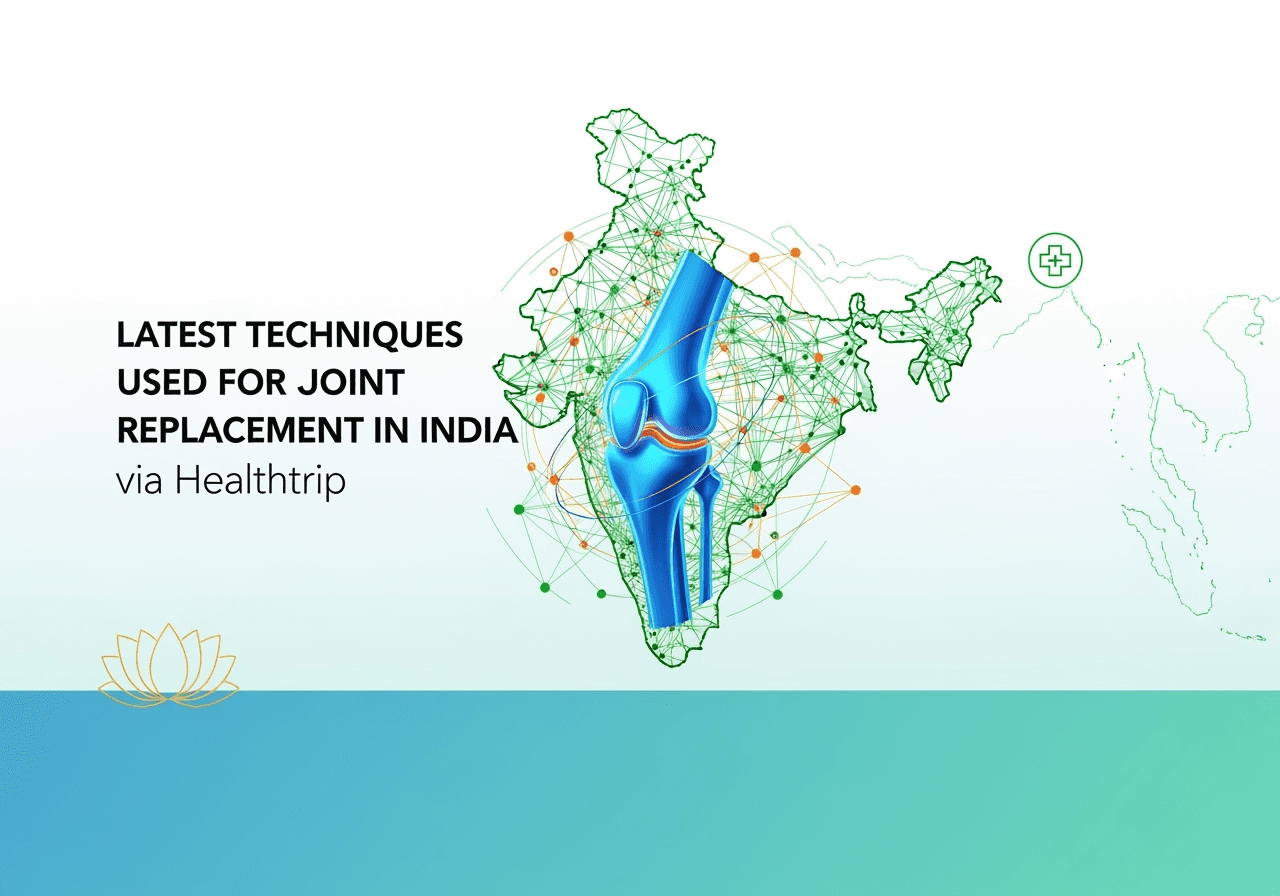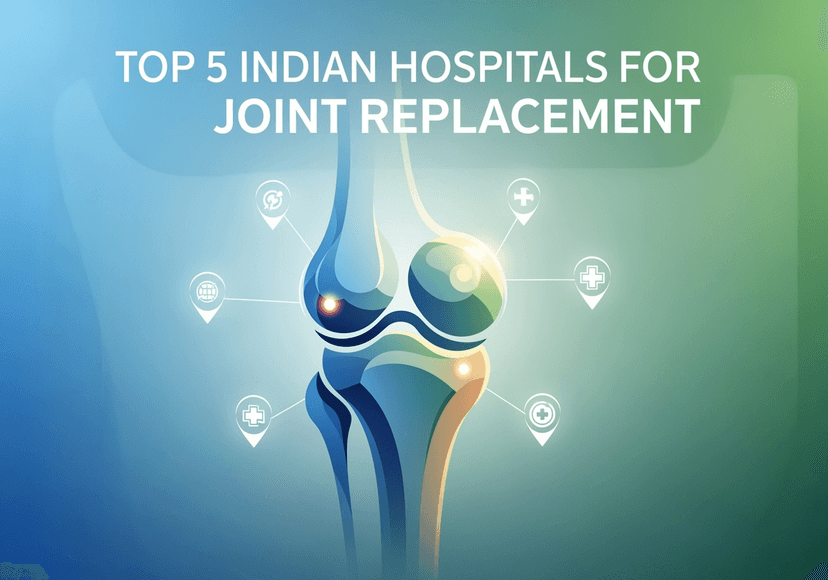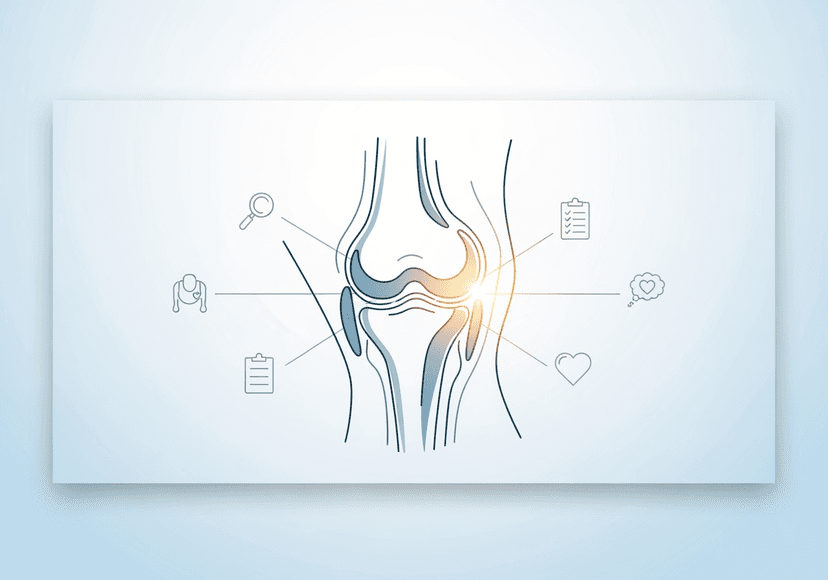
Latest Techniques Used for Joint Replacement in India via Healthtrip
13 Oct, 2025
 Healthtrip
Healthtrip- < li>Where in India Can You Find Cutting-Edge Joint Replacement?
- Why Choose India for Your Joint Replacement Surgery?
- Who is a Good Candidate for Advanced Joint Replacement Techniques?
- How are Minimally Invasive Joint Replacement Techniques Performed in India?
- Examples of Advanced Techniques and Hospitals Offering Them
- Post-Operative Care and Recovery in India
- Conclusion
Minimally Invasive Joint Replacement
Minimally invasive joint replacement surgery represents a significant leap forward in orthopedic care. Unlike traditional open surgery, which involves a large incision and significant disruption to surrounding tissues, minimally invasive techniques utilize smaller incisions, often just a few inches long. This approach results in less pain, reduced blood loss, a lower risk of infection, and a faster recovery time for patients. The surgeons at hospitals like Fortis Hospital, Noida, and Max Healthcare Saket in Delhi are trained in performing these procedures. These techniques often involve specialized instruments and advanced imaging technologies that allow surgeons to visualize the joint with greater precision and accuracy, ultimately leading to better outcomes and improved patient satisfaction. Healthtrip can help you connect with these experts, offering customized consultation and treatment plans so you can return to your active life sooner than you thought possible, imagine getting back to your morning walks or evening dance classes pain-free!
Most popular procedures in India
Robotic-Assisted Joint Replacement
Robotic-assisted joint replacement is another groundbreaking advancement transforming orthopedic surgery. These systems don't replace the surgeon but act as an extension of their skills, providing enhanced precision and control during the procedure. With robotic assistance, surgeons can achieve a higher degree of accuracy in implant placement, leading to improved joint alignment and function. This is particularly beneficial in complex cases or revision surgeries where precision is paramount. Hospitals like Fortis Memorial Research Institute, Gurgaon, are at the forefront of adopting this technology. The robotic systems provide real-time feedback and guidance, allowing surgeons to make minute adjustments and ensure optimal outcomes. For patients, this translates to a more personalized and precise surgical experience, potentially leading to a longer-lasting implant and improved quality of life. Healthtrip makes the process of accessing these advanced technologies seamless and stress-free, offering guidance and support every step of the way to ensure you find the perfect match for your needs and get you dancing that waltz without a grimace in record time!
Advanced Materials in Joint Implants
The longevity and performance of joint implants depend heavily on the materials they're made from. Significant advancements have been made in recent years in the development of biocompatible and durable materials. Modern implants often utilize materials like advanced ceramics, highly cross-linked polyethylene, and improved metal alloys. These materials offer superior wear resistance, reduced friction, and enhanced biocompatibility, minimizing the risk of implant failure and promoting better integration with the surrounding bone and tissues. At hospitals like LIV Hospital, Istanbul and Memorial Sisli Hospital you get access to the latest implant technologies. For instance, highly cross-linked polyethylene has been shown to significantly reduce wear rates compared to traditional polyethylene, extending the lifespan of the implant. Similarly, improved metal alloys offer enhanced strength and resistance to corrosion. Healthtrip can provide detailed information about the types of implants available and connect you with surgeons who are experienced in using these advanced materials. Rest assured, with Healthtrip, you're not just getting a new joint; you're getting the peace of mind that comes with knowing you have access to the best materials and expertise, enabling you to conquer those hiking trails you've been dreaming about.
Wellness Treatments
Give yourself the time to relax
Lowest Prices Guaranteed!

Lowest Prices Guaranteed!
Where in India Can You Find Cutting-Edge Joint Replacement?
India has emerged as a global hub for medical tourism, and joint replacement surgery is no exception. Several cities across the country boast world-class hospitals and skilled orthopedic surgeons proficient in advanced joint replacement techniques. Delhi, Mumbai, Chennai, and Bangalore are particularly well-known for their concentration of top-tier medical facilities. These metropolitan areas offer a blend of experienced doctors, state-of-the-art technology, and comprehensive rehabilitation programs, making them attractive destinations for patients seeking joint replacement. Fortis Hospital, Noida, and Max Healthcare Saket in Delhi stand out as reputable institutions providing a range of joint replacement procedures, from traditional to minimally invasive approaches. Similarly, hospitals in Mumbai and Chennai, such as those affiliated with international healthcare groups, offer specialized joint replacement centers equipped with the latest diagnostic and surgical equipment. Bangalore, often referred to as India's Silicon Valley, also boasts a number of advanced orthopedic centers renowned for their expertise in robotic-assisted joint replacement and personalized implant solutions. These cities provide a comprehensive ecosystem for joint replacement, encompassing pre-operative assessments, surgical interventions, and post-operative care, all tailored to meet the individual needs of patients.
Top Cities for Joint Replacement
Within India, certain cities have established themselves as leaders in joint replacement surgery due to a combination of factors, including the availability of skilled surgeons, advanced medical infrastructure, and patient-centric care. Delhi, as the capital city, attracts a large pool of experienced orthopedic specialists and medical professionals. Hospitals like Fortis Shalimar Bagh and Fortis Hospital, Noida, are known for their expertise in performing complex joint replacement surgeries, including revision surgeries for patients who have previously undergone joint replacement elsewhere. Mumbai, being a major commercial and healthcare hub, offers a diverse range of hospitals and clinics specializing in orthopedics. Chennai, often referred to as India's healthcare capital, has a long-standing tradition of medical excellence, with numerous hospitals providing high-quality joint replacement services. Bangalore, with its focus on innovation and technology, is home to advanced orthopedic centers that offer cutting-edge surgical techniques and personalized treatment plans. These cities provide patients with a range of options to choose from, allowing them to select the hospital and surgeon that best suit their individual needs and preferences. Healthtrip can assist in navigating these options and connecting patients with the appropriate medical providers.
Why Choose India for Your Joint Replacement Surgery?
India has become an increasingly popular destination for joint replacement surgery for a multitude of compelling reasons. One of the most significant factors is the cost-effectiveness of medical treatment in India compared to developed countries like the United States or the United Kingdom. The cost of joint replacement surgery, including pre-operative assessments, surgery, post-operative care, and rehabilitation, is substantially lower in India without compromising on the quality of care. This makes it an attractive option for patients seeking affordable yet high-quality medical treatment. Furthermore, India boasts a large pool of highly skilled and experienced orthopedic surgeons who have undergone extensive training both in India and abroad. Many Indian surgeons have gained international recognition for their expertise in performing complex joint replacement procedures, including minimally invasive techniques and revision surgeries. The presence of advanced medical technology, including robotic-assisted surgical systems, computer navigation, and 3D printing for personalized implants, further enhances the quality of joint replacement surgery in India. Indian hospitals are equipped with state-of-the-art facilities and adhere to international standards of hygiene and safety, ensuring a comfortable and safe experience for patients.
Cost-Effectiveness and Quality of Care
The combination of cost-effectiveness and high-quality care is a major draw for patients choosing India for joint replacement surgery. The lower cost of treatment allows patients to save a significant amount of money compared to undergoing the same procedure in their home country, while still receiving excellent medical care. This cost advantage is not achieved through compromising on quality but rather through lower operating costs and a different economic environment. Indian hospitals and surgeons are committed to providing the best possible care to their patients, utilizing advanced medical technology and adhering to international standards and protocols. The focus on patient-centric care ensures that patients receive personalized attention and support throughout their journey, from pre-operative assessments to post-operative rehabilitation. This commitment to quality and affordability has made India a preferred destination for medical tourists seeking joint replacement surgery. Healthtrip plays a vital role in connecting patients with reputable hospitals and surgeons in India, ensuring that they receive the best possible care at an affordable price.
Who is a Good Candidate for Advanced Joint Replacement Techniques?
Determining who is a good candidate for advanced joint replacement techniques involves a comprehensive evaluation of various factors, including the patient's overall health, the severity of their joint condition, and their personal goals and expectations. Generally, individuals who experience significant pain and functional limitations due to joint damage, such as osteoarthritis, rheumatoid arthritis, or traumatic injuries, may be considered for joint replacement. However, not everyone with joint pain is automatically a suitable candidate. A thorough medical history, physical examination, and imaging studies, such as X-rays or MRI scans, are necessary to assess the extent of joint damage and determine the most appropriate treatment options. Patients who are in relatively good health and have no significant medical contraindications are typically better candidates for advanced joint replacement techniques. This is because these techniques often require a higher level of fitness and may be associated with a slightly longer recovery period compared to traditional joint replacement. Furthermore, patients who are motivated to actively participate in rehabilitation and follow post-operative instructions are more likely to achieve successful outcomes.
Factors Determining Candidacy
Several critical factors influence whether a patient is a suitable candidate for advanced joint replacement techniques. The severity of joint damage is a primary consideration, as advanced techniques like minimally invasive surgery or robotic-assisted joint replacement may be more appropriate for patients with less severe joint degeneration. The patient's age and overall health status also play a significant role. Younger patients or those with good general health may be better able to tolerate the demands of advanced surgical procedures and recover more quickly. However, older patients or those with underlying medical conditions may still be considered for advanced techniques if their overall health is stable and their joint pain is significantly impacting their quality of life. Patient expectations are another important factor to consider. It's essential for patients to have realistic expectations about the potential benefits and limitations of advanced joint replacement techniques. They should understand that while these techniques may offer advantages such as smaller incisions and faster recovery, they may not be suitable for every patient or every type of joint problem. A detailed discussion with an orthopedic surgeon is crucial to determine the best treatment option based on the individual patient's needs and circumstances. Healthtrip can facilitate these crucial consultations, connecting patients with experienced orthopedic surgeons who can assess their suitability for advanced joint replacement techniques.
Also Read:
How are Minimally Invasive Joint Replacement Techniques Performed in India?
Minimally invasive joint replacement techniques in India represent a significant leap forward in orthopedic surgery, offering a patient-centric approach that prioritizes faster recovery and reduced trauma. Unlike traditional open surgery, these methods involve smaller incisions, typically ranging from 3 to 6 inches, which minimize disruption to surrounding muscles and tissues. Surgeons utilize specialized instruments and advanced imaging technologies, such as computer-assisted navigation and robotic assistance, to precisely align and position the new joint components. This precision is crucial for ensuring the long-term stability and functionality of the artificial joint. The smaller incisions also translate to less blood loss during surgery, reducing the need for blood transfusions and lowering the risk of complications. Furthermore, patients often experience less post-operative pain and scarring, contributing to a more comfortable and aesthetically pleasing outcome. Healthtrip facilitates access to top-tier hospitals in India equipped with state-of-the-art facilities and experienced surgeons who are proficient in performing these advanced procedures, ensuring you receive the best possible care and achieve optimal results.
The specific techniques employed can vary based on the individual's needs and the joint being replaced. For instance, direct anterior hip replacement, a minimally invasive approach, involves accessing the hip joint from the front of the body, avoiding the need to cut through major muscles. This can lead to a quicker return to normal activities and a lower risk of hip dislocation. Similarly, in knee replacement, quadriceps-sparing techniques can minimize disruption to the quadriceps muscle, resulting in improved knee function and a faster recovery. Indian surgeons are also adept at using custom-made implants, tailored to the patient's unique anatomy, which can further enhance the precision and longevity of the joint replacement. Healthtrip collaborates with hospitals that offer comprehensive pre-operative assessments and personalized treatment plans, ensuring that each patient receives the most appropriate minimally invasive technique based on their specific condition and goals. This holistic approach, combined with the expertise of Indian orthopedic surgeons, contributes to the high success rates and patient satisfaction associated with joint replacement surgery in India.
Examples of Advanced Techniques and Hospitals Offering Them
India has emerged as a hub for advanced joint replacement techniques, with several hospitals pioneering and perfecting cutting-edge procedures. One prominent example is computer-assisted surgery (CAS), which enhances the precision of implant placement using sophisticated navigation systems. Hospitals like Fortis Memorial Research Institute, Gurgaon, and Max Healthcare Saket in New Delhi, are renowned for their expertise in CAS, offering patients improved alignment and stability of the artificial joint. Robotic-assisted surgery is another groundbreaking technique gaining traction, enabling surgeons to perform joint replacements with unparalleled accuracy and control. These hospitals invest heavily in advanced robotics technology and train their surgeons extensively to ensure optimal outcomes. Furthermore, some centers specialize in custom-made implants, designed using 3D printing technology to perfectly match the patient's unique anatomy. This personalized approach can lead to better joint function and a more natural feel after surgery. Healthtrip partners with these leading hospitals, ensuring that patients have access to the most advanced techniques and experienced surgeons in India.
Beyond technological advancements, Indian hospitals are also at the forefront of innovative surgical approaches. Minimally invasive techniques, such as direct anterior hip replacement and quadriceps-sparing knee replacement, are widely practiced, minimizing muscle damage and promoting faster recovery. Fortis Hospital, Noida, is known for its expertise in these minimally invasive procedures. These approaches often involve smaller incisions, leading to less pain, reduced blood loss, and quicker rehabilitation. Moreover, Indian surgeons are skilled in revision joint replacement, addressing complications or failures from previous surgeries. Complex cases often require specialized expertise and advanced techniques, and hospitals like Max Healthcare Saket have dedicated teams focused on revision procedures. Healthtrip meticulously vets its partner hospitals to ensure they meet the highest standards of quality and safety, providing patients with peace of mind and confidence in their choice of treatment. Choosing India through Healthtrip means accessing a network of world-class facilities and experienced surgeons committed to delivering exceptional results in joint replacement surgery. Vejthani Hospital located in Thailand is also known for its sophisticated technology and is another good consideration.
Also Read:
Post-Operative Care and Recovery in India
Post-operative care and recovery are critical components of a successful joint replacement journey, and India offers a comprehensive and supportive environment for patients. Following surgery, patients typically spend a few days in the hospital, where they receive pain management, wound care, and early mobilization support. Physical therapy starts almost immediately, focusing on restoring range of motion, strength, and stability in the new joint. Indian hospitals often have dedicated rehabilitation units with experienced physical therapists who tailor exercise programs to each patient's specific needs and progress. The emphasis is on gradual and progressive rehabilitation, ensuring that patients regain their independence and return to their daily activities as quickly and safely as possible. Healthtrip coordinates with hospitals that provide personalized discharge plans and ongoing support, ensuring a smooth transition from the hospital to home or a rehabilitation facility. This includes education on medication management, wound care, and activity restrictions.
Many patients opt to stay in India for a period of post-operative rehabilitation, taking advantage of the country's affordable and high-quality healthcare services. Several rehabilitation centers specialize in joint replacement recovery, offering intensive physical therapy, occupational therapy, and other supportive services. These centers provide a comfortable and supportive environment, allowing patients to focus on their recovery without the distractions and responsibilities of daily life. Moreover, many Indian hospitals offer telemedicine services, enabling patients to connect with their surgeons and physical therapists remotely for follow-up consultations and guidance. This ensures continuity of care and allows patients to address any concerns or questions they may have during their recovery. Healthtrip can assist with arranging accommodation, transportation, and other logistical support for patients and their families, making the recovery process as stress-free as possible. With its holistic approach to post-operative care and recovery, India provides an ideal setting for patients to achieve optimal outcomes after joint replacement surgery.
Conclusion
Choosing India for your advanced joint replacement surgery through Healthtrip offers a compelling combination of expertise, innovation, and affordability. The country's leading hospitals boast state-of-the-art facilities, experienced surgeons, and a commitment to providing personalized care. From minimally invasive techniques to robotic-assisted surgery and custom-made implants, Indian orthopedic centers are at the forefront of innovation, ensuring optimal outcomes and faster recovery for patients. Furthermore, the comprehensive post-operative care and rehabilitation services available in India provide a supportive environment for patients to regain their independence and return to their daily activities. Healthtrip simplifies the process of accessing these world-class healthcare services, coordinating every aspect of your journey from initial consultation to post-operative follow-up. By choosing Healthtrip, you can embark on your joint replacement journey with confidence, knowing that you are receiving the best possible care in a welcoming and supportive environment.
Related Blogs

End-to-End Logistics for Joint Replacement with Healthtrip's Support
Detailed guide on joint replacement, featuring doctors, hospitals, risks, recovery,

Healthtrip's Care Coordinators: Your Support During Joint Replacement
Detailed guide on joint replacement, featuring doctors, hospitals, risks, recovery,

Top 5 Indian Hospitals for Joint Replacement
Detailed guide on joint replacement, featuring doctors, hospitals, risks, recovery,

Post-Joint Replacement Diet and Lifestyle Tips
Detailed guide on joint replacement, featuring doctors, hospitals, risks, recovery,

Common Risks in Joint Replacement and How Healthtrip Manages Them
Detailed guide on joint replacement, featuring doctors, hospitals, risks, recovery,

Is Joint Replacement Right for You? Healthtrip Explains Evaluation Steps
Detailed guide on joint replacement, featuring doctors, hospitals, risks, recovery,










